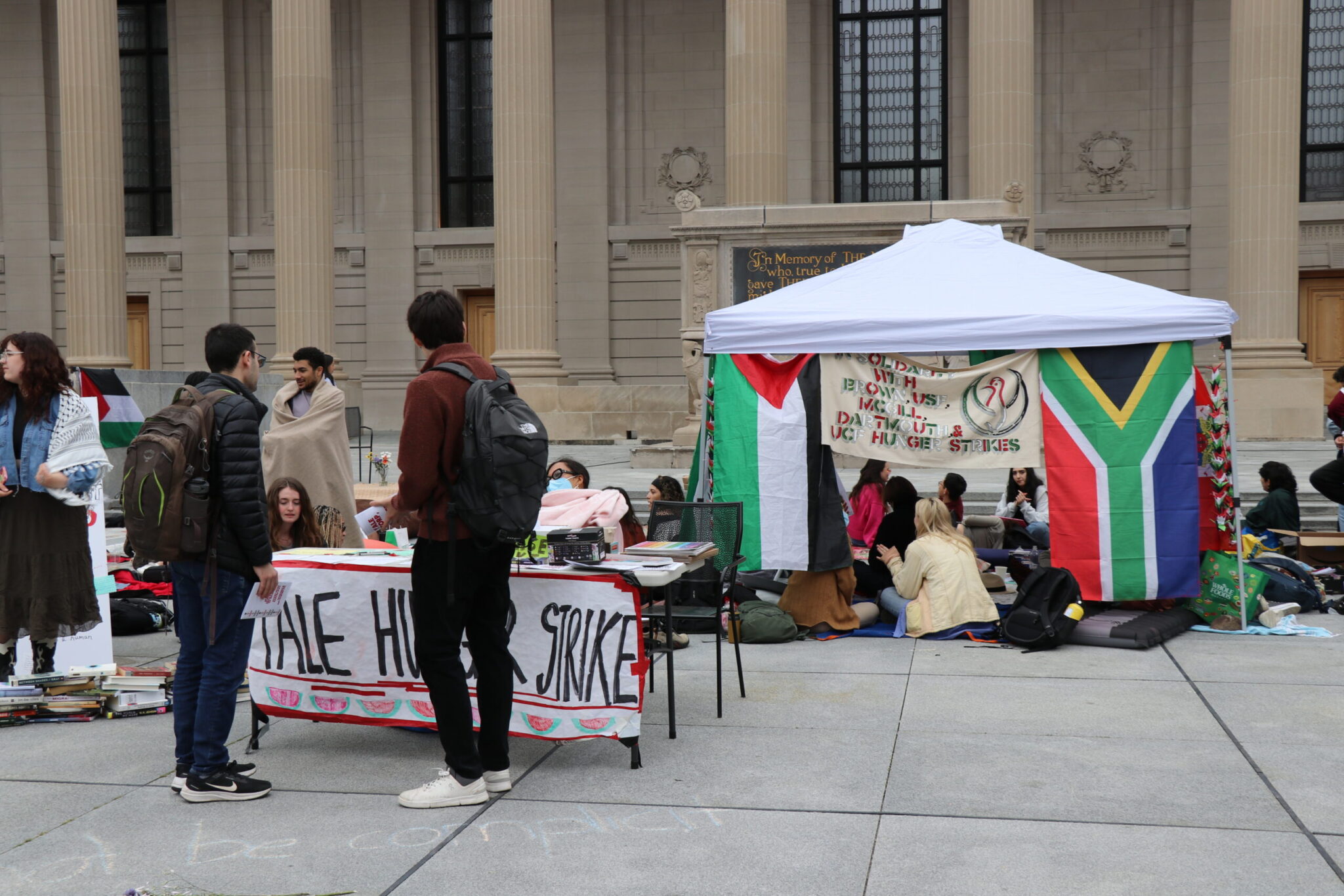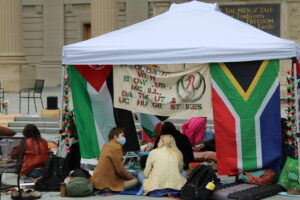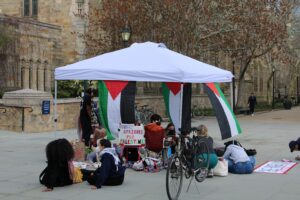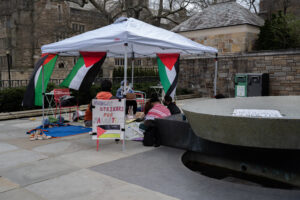Students continue hunger strike to demand University divestment from weapons manufacturing
As protesters concluded the fifth day of their hunger strike on Wednesday, they moved their tent from Cross Campus to Beinecke Plaza.

Christina Lee, Photography Editor
On Saturday, April 13, a coalition of about a dozen Yalies known as Hunger Strikers for Palestine began a hunger strike as part of an ongoing effort to demand that the University divest from weapons manufacturers involved in Israel’s war against Hamas in Gaza. The strike comes a week before the Yale Corporation is scheduled to have its last meeting before the end of the semester on April 20.
The group, which now consists of two undergraduate and 12 graduate students, originally threatened to go on a hunger strike in a Wednesday letter to University President Peter Salovey. In the letter, students demanded that the University publish a statement by the morning of Friday, April 12, committing to divestment from weapons manufacturers “contributing to Israel’s assault on Palestine.” In the absence of such a commitment, the students said at a press conference on Friday, April 12, that they would begin their strike.
While Yale adopted a policy in 2018 which forbade the University from investing in assault weapons retailers, the Yale Corporation has not divested from weapons manufacturers, a source of monthslong outcry from various students and groups. A university spokesperson told the News at the beginning of April that the Yale Advisory Council on Investor Responsibility, or ACIR, was considering the “two separate but related issues” of investments in weapons retailers and manufacturers and that the ACIR is preparing to update the community in the “coming weeks.”
The current hunger strike comes seven years after an April 2017 hunger strike in which eight members of the graduate student union Local 33 UNITE HERE sought to pressure Yale into beginning contract negotiations. In February 2017, Local 33 had won eight departmental labor elections, but the University refused to sit down with the union due to pending legal appeals with the National Labor Relations Board at the time. The hunger strike was virtually unprecedented in labor organizing history.
In 2017, when asked to respond to the hunger strike, Salovey read a previous statement from the University which asked students to “reconsider” their decision to strike, citing the potential harm that hunger striking could pose to students’ health. In the same statement, Yale described the hunger strike as “unwarranted by the circumstances.”
The 2017 hunger strike, which lasted almost four weeks across multiple waves of fasters, also saw graduate students camping in Beinecke Plaza outside of Woodbridge Hall. The 2017 strike also saw multiple marches as hundreds of graduate students and supporters continued to push for negotiations.
The News will follow the strike and any responses to it and intends to provide daily updates in the feed below.
— Yolanda Wang, Staff Reporter
April 17 — Day 5
On the fifth day of the hunger strike, the University announced that it would not divest from military weapons manufacturing. In a statement announcing the decision, the Yale Advisory Committee on Investor Responsibility “concluded that military weapons manufacturing for authorized sales did not meet the threshold of grave social injury, a prerequisite for divestment.”
Some hunger strikers and other protesters on Beinecke Plaza gathered their belongings and left the plaza soon after learning about the University’s decision. However, strikers expressed their intent to continue with their protests.
“On the [fifth] day of my hunger strike, this news is not demoralizing; it is instead a call to sustain my efforts to draw attention to the social harm that this institution is perpetuating,” Ky Miller YSE ’25 wrote to the News. “We will not rest until Yale divests.”
In a statement on their Instagram page, students announced that they will “continue to hunger strike” until University President Peter Salovey and the Yale Board of Trustees directly respond to strikers’ demands for divestment.
Protesters also described previous attempts to appeal to trustees’ broader interests in the United States. Lukey Ellsberg, a fourth-year Ph.D. student in Religious Studies, previously gave a presentation on social, public health and environmental consequences of weapons manufacturing in the U.S. at the ACIR’s November 2023 meeting. According to Ellsberg, another speaker presented on the global violence and death toll “enabled” by Yale’s investments.
“[The other speaker and I] coordinated to address the widest possible interpretations of ‘grave social harm,’” Ellsberg wrote. “If harm to Palestinians wouldn’t move [the trustees], perhaps they would care about Americans — and if not the people, then perhaps the land. It did not occur to us that they might define ‘grave social harm’ as ‘Yale getting infinitesimally less rich.’ We should have anticipated this when they said they were consulting the Ethical ‘Investor’ rather than the Ethical ‘Normal Functioning Human Conscience.’”
Ellsberg referred to the book “The Ethical Investor: Universities and Corporate Responsibility,” a 1972 book that established principles of ethical endowment investment to which the ACIR adheres when reviewing investment policies.
On Wednesday, hunger strikers also responded to comments from members of Yale Friends of Israel, who set up tables on Cross Campus on Monday and Tuesday to hold dialogue with passersby on the topic of Israel. Eytan Israel ’26, who helped staff the table, cited a video from a press conference that hunger strikers held on Friday, April 12, in which a pro-Palestine protestor read a poem from the Instagram account “Gaza Poets Society” as a “spiritual call.”
“To the people that financed, encouraged and facilitated this mass killing against us, may death follow you everywhere you go, and when it does, I hope you will not be prepared,” the protester said in the video.
According to Israel, the video called “for the death of those who support Israel.” In an email to the News, Israel also wrote that Jewish students feel “extremely threatened” by the hunger strikers.
A member of Hunger Strikers for Palestine, who asked to remain anonymous out of concern for retaliation if identified, explained that the video was not a threat.
“The poem itself is speaking not to death, not even as literal death, but more so the haunting brought about by historical disavowal of colonial violence,” the member said. “So ‘may death follow you,’ it’s more so ‘may you carry this haunting of the disavowal of your violence with you.’ It’s so far from a death threat. That was never the intention of the citation of the quote.”
The protestee also explained that the hunger strikers’ tent, while still located on Cross Campus on Monday, remained at a distance from the tables staffed by Yale Friends of Israel.
“We never said anything antagonistic, nor did we even have any interactions with them in any way,” said the protestor. “I think both of our parties were just practicing our freedom of expression in very peaceable ways, so [these accusations are] really unfounded.”
— Yolanda Wang, Staff Reporter
April 16 — Day 4
On Tuesday, protesters entered the fourth day of the hunger strike and moved the tent from Cross Campus to Beinecke Plaza. A hunger striker and graduate student who goes by D, to whom the News granted anonymity due to personal safety concerns, said that “all of [the organizers] are feeling the effects of the strike.”
D said that strikers have reported symptoms including migraines, diarrhea and difficulty sleeping.
“Most of us are feeling very low energy, we’re having issues being as quick on our toes, we’re feeling the effects of not having food. But this is nothing, not even a fraction, compared to the agonies that Gazans are being subjected to by Israel’s policies for starvation,” D told the News. “So this is the bare minimum we can do. And we will keep doing it until President Salovey and the Board of Trustees meet our demands.”
Two hunger strikers — who requested anonymity out of concern for the safety of themselves and family if publicly identified — shared this morning that Yale Health officials checked in on their well-being on Sunday but told strikers that they were not sent by Yale administrators.
“They say the administration didn’t send them,” one of the two strikers said.“That’s what they say. But honestly, I think Yale is just trying to cover their tracks to say that they checked in with us.”
A University spokesperson told the News that the administration had contacted organizers and hunger strikers “to emphasize the importance of their health during this time.” She said that administrators have suggested that participants of the hunger strike, especially those who may have pre-existing medical conditions, consult with Yale Health health clinicians.
“Yale Health clinicians have been meeting to plan their support of the students; they determined that it would be helpful to stop by the tent periodically to support the students’ health needs,” the spokesperson said.
Madeline Wilson, Chief Quality Officer of Yale Health, did not respond immediately to a request for comments on behalf of Yale Health.
“Someone asked me how long we intended to hold on,” Miguel Monteiro, a graduate student in Near Eastern Languages & Civilizations, wrote in a statement on the hunger strikers’ Instagram page on Monday. “How long does Yale intend to hold on? What is in arms investment that makes it so difficult for Yale to let go, what is the ‘rational consideration of the arguments,’ as a faculty member put it to the Daily, when genocide is on the other side?”
Barry Nalebuff, a School of Management professor specializing in negotiation and game theory, previously told the News that Yale makes decisions based on “rational consideration of the arguments,” rather than the “impassioned views of a few students.”
A University spokesperson did not immediately respond to a request for comment regarding Monteiro’s criticisms.
— Karla Cortes, Yolanda Wang and Nora Moses, Staff Reporters
April 15 — Day 3
April 14 — Day 2
On the second day of the hunger strike, students across the University continued their letter-writing campaign to University President Peter Salovey in support of the strikers. The strikers’ tent on Cross Campus in front of Sterling Memorial Library also included an art build, where students created posters in support of the strikers, and Palestinian flags. An organizer — who requested anonymity out of concern for potential retaliation if publicly identified — confirmed that the 14 original strikers were all still participating.
“Day two, a lot of the hunger strikers are feeling lower energy, but we’re firm in our commitment to liberation of Palestine and also of course in our urge to Yale to divest from weapons manufacturing,” the organizer said.
Throughout the day, passers-by have stopped for the art build, letter writing or to ask the protestors questions.
On Instagram, the organizers wrote that in the morning, a security guard was posted where the strikers had been on the first day of the strike, so they moved to a more central location in front of Sterling Library. The organizer who spoke to the News said that while Yale Security officers were near the protest on and off through the day, there was no Yale or New Haven police presence on the second day.
The University has not yet released a public statement regarding the protest, though faculty members weighed in with the News. By and large, professors expressed concern for the health of the students on strike while also affirming those students’ right to protest peacefully.
“I’m trying to put myself in Salovey’s shoes, and I think he should talk with them directly and offer a kind of timeline for this decision,” political science professor James Scott told the News. “Administrations are often happy to wait these things out, but Salovey should be concerned enough to engage with them and provide a reasonable timeline. Nobody wants anyone to get hurt here.”
— Tristan Hernandez and Nora Moses, Staff Reporters
Ben Raab contributed reporting.
April 13 — Day 1
On the first day of the strike from 11 a.m. to 3 p.m., students gathered on Cross Campus to handwrite letters to Salovey in support of the hunger strikers. Five of the hunger strikers were present at the event. The gathering also featured an art build, where students created posters and signs with messages of protest against Yale’s weapons investments.
In a statement at a press conference on April 12, student organizers said that the hunger strike was “organized in solidarity” with strikers at Brown University, Dartmouth College, McGill University and the University of Southern Florida, among other schools.
By the time the strike commenced on April 13, the University had not released a public statement regarding the strike. Yale’s spokesperson previously wrote to the News that Yale is “committed to free expression and the right to peaceful protest” and that University administrators have reached out to protestors to “provide them with resources.”
— Yolanda Wang, Staff Reporter
Laura Ospina contributed reporting.










